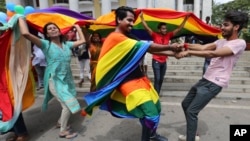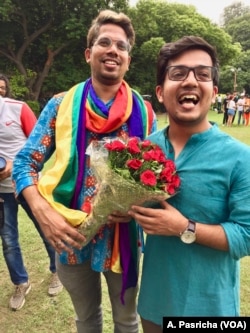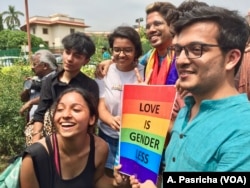In India, the Supreme Court has struck down a 19th century law criminalizing gay sex, bringing to a close a long drawn out battle to overturn a controversial law that was a remnant of the country’s colonial past.
Calling the British era law “irrational, indefensible and manifestly arbitrary,” Chief Justice Dipak Misra said consensual sex between adults in a private space “cannot be denied as it is a matter of individual choice.”
There were cheers, tears and hugs as a wave of joy swept through the LGBT (lesbian, gay bisexual and transgender) community in the country on hearing that Section 377 had been scrapped. Calling it an “unnatural offense” the law made gay sex punishable with up to 10 years in prison.
Breaking down after hearing the verdict outside the Supreme Court in New Delhi, corporate employee Ali Ahmad Faraz, said “I am no longer a criminal in my country for a crime I never committed. Now we can walk toward equality in this country.” He said his partner will join him in the evening to celebrate and “for the first time in our relationship we will be spending the time as normal human beings, not criminals.”
Although the law was seldom enforced, the gay community said it opened them to harassment and discrimination, and made it impossible for them to seek justice if they were victims of violence, rape or other crimes like blackmail.
Strangers handed flowers to members of the community, some waved banners while others celebrated quietly, overcome with emotion. “I am really speechless. It makes a huge difference, being legal to illegal,” said Bismaya Kumar Raulo with the LGBT advocacy group, Impulse.
The verdict by the five-judge bench was unanimous. One of the judges, Indu Malhotra, said she believed the LGBT community was owed an apology.
Long battle
Scrapped by the Delhi High Court in 2009, the law was reinstated four years later in response to challenges from conservative Hindu, Muslim and Christian groups. That judgment sent shockwaves through the gay community, but also made them more assertive. Thursday’s verdict came in response to a number of petitions by gays and lesbians who challenged the constitutional basis of the 2013 ruling.
Among those who joined the petitioners were students and alumni of some of India’s most prestigious colleges.
In a conservative country, political parties have steered clear of declaring their position openly on gay rights but the ruling Bharatiya Janata Party had told the court that it will support whatever decision it takes.
On Thursday, the opposition Congress Party welcomed the “progressive and decisive verdict.” A senior party member, Shashi Tharoor, said the “government has no space in bedrooms as this is a private act between consenting adults. This is a dawn of freedom."
Human rights activists hoped the impact of lifting the ban on gay sex would be felt beyond India and prompt other countries that outlaw homosexuality to reconsider their laws.
Only first step
Activists who have spearheaded the decades long battle to win gay rights said overturning the law is an historic decision, but only a first step in winning gay rights.
In a country where homosexuality is still widely frowned upon, activists said the next challenge will be to build societal acceptance. “It’s a long journey we need to tread. Legal acceptance was the first milestone. Society needs to evolve,” said Bhuwan Kathuria as he stood outside the court waving a banner.
Undergraduate student at Delhi University, Raabiya (one name only), who came to the court to “celebrate our first day of acceptance in the country,” said they often face ridicule in college from other students. “They calls us names, they tease us, they bully us, so it is still very prevalent.”
Even as the community celebrates, it will have to gear up for other battles, said another gay rights activist, Ruth Chawngthu.“A lot of people think that this is the end and everyone is going to have rights now, marriage, equality and whatever, but this not the end, this is just the beginning and we have a long way to go.”



